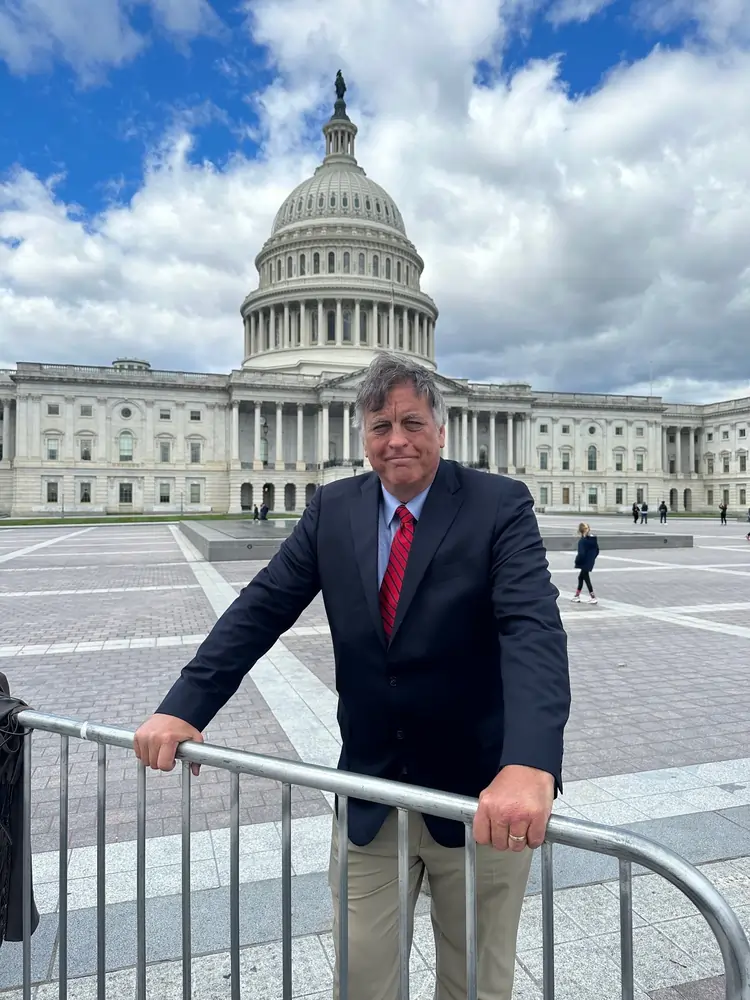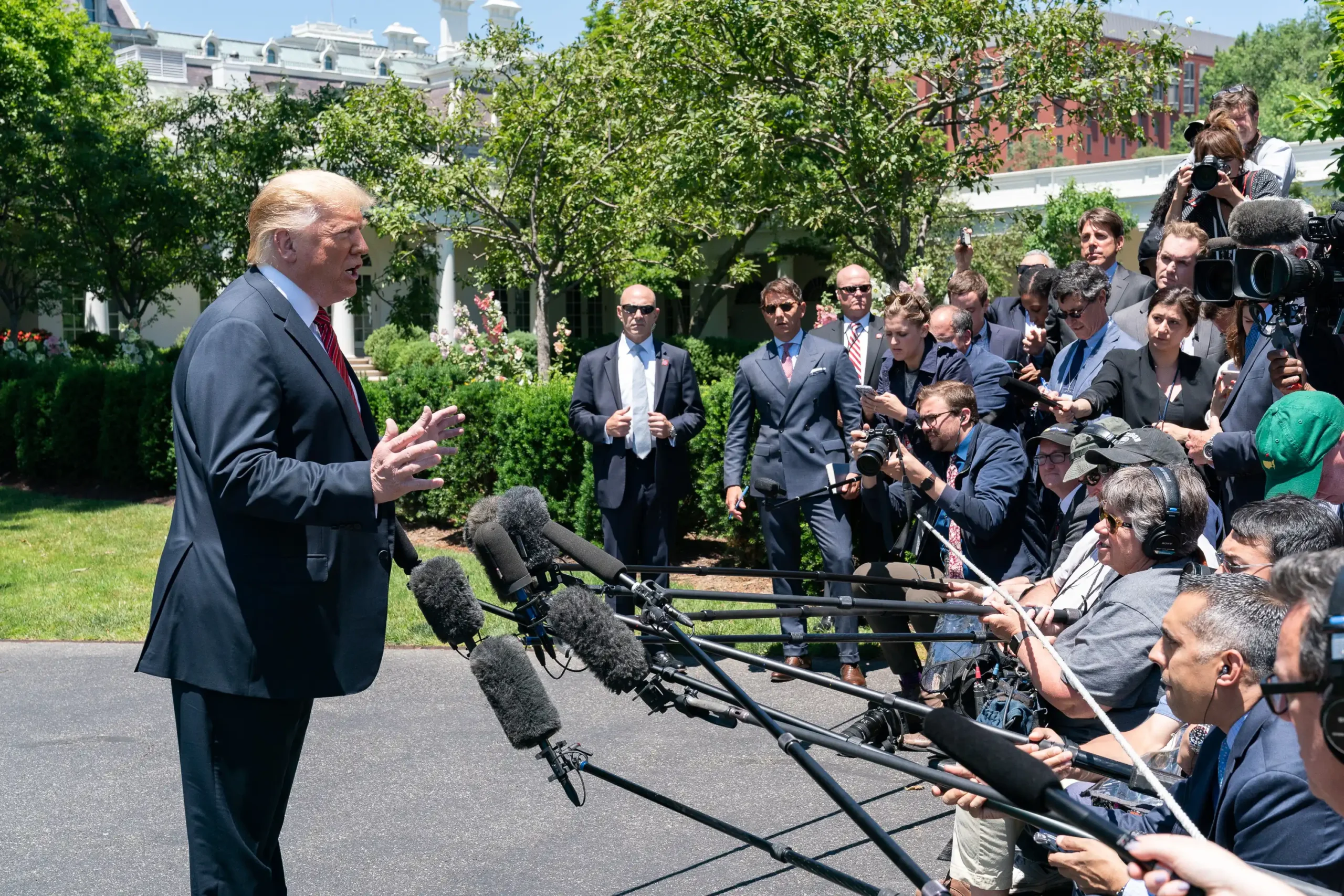Project 2025: America’s gravest constitutional stress test since the Civil War

Mike Bedenbaugh
- Published
- Opinion & Analysis

As America approaches its 250th birthday, a new political blueprint—Project 2025—sets out a radical plan to centralise presidential power, dismantle constitutional checks, and redefine the nation’s civic life. it marks the most serious challenge to the republic’s foundations since the Civil War, warns the U.S political analyst, Mike Bedenbaugh
When Americans commemorate the end of World War II, we recall victory abroad and the rebirth of democratic institutions. After 1945, the United States poured its strength into a transatlantic order rooted in liberal democracy. We stood shoulder to shoulder with Western Europeans to guard against fascism and tyranny, building NATO, the Marshall Plan, and a shared faith in constitutional limits.
But today, on the eve of America’s 250th birthday, our republic faces the gravest internal stress test since the Civil War.
Project 2025 is a detailed 900-page manual – Mandate for Leadership: The Conservative Promise – produced by a think tank called The Heritage Foundation and written by over 400 authors, including at least 140 former Trump administration officials.
It outlines four “promises” for a new presidency:
- Restore the “traditional” family as centerpiece of American life.
- Dismantle the administrative state.
- Defend sovereignty through closed borders and cultural nationalism.
- Secure “God-given rights” as defined by a single ideological movement.
On its surface, these may look like standard conservative priorities. But in practice, Project 2025 is in my view an unprecedented plan to centralise executive power, marginalise dissent, and reorder American life by decree.
A Republic, If We Can Keep It
At the close of the Constitutional Convention in 1787, Benjamin Franklin was asked whether the Framers had created a monarchy or a republic. His reply was stark: “A republic, if you can keep it.” Franklin understood that America’s experiment would always be fragile, dependent not on power but on civic virtue and constitutional restraint.
Yet a generation of leaders now ascend who have not internalised that lesson. Raised in an era when civics education was gutted in schools, they were instead taught that America’s greatness lay in its ability to militarily conquer any adversary. For them, America is Reagan’s “shining city on a hill,” but one whose glow is cast not by free citizens debating in open forums, but by the largest arsenal of bombs on earth.
That philosophy has bred leaders who trust force more than persuasion, central command more than deliberation, and raw power more than fragile constitutional norms.
The Betrayal of Liberal Democracy
Liberal democracy rests on mistrust of concentrated power. Debate, compromise, and institutional checks safeguard pluralism. Project 2025 betrays this inheritance. It assumes that Washington must be centralised and that only one quarter of the nation can be trusted with power. The others – progressives, immigrants, LGBTQ citizens, secular Americans – are cast as enemies of the state.
This violates the spirit of American constitutionalism. Since World War II, both parties, however divided, have largely respected the Madisonian balance. Congress, courts, and the presidency were rivals. Project 2025 seeks to end that rivalry. Its architects urge the next president to treat bureaucracy, courts, and even states as obstacles to be bent or broken.
Corporatism Masquerading as Republicanism
Here lies the paradox: many of Project 2025’s stated concerns are not illegitimate. I, too, see the dangers of an unchecked administrative state. For decades, Congress has ceded authority to unelected bureaucracies, and reform is overdue.
But Project 2025’s answer is not renewal but regression. Rather than opening debate to citizens and trusting them to weigh competing solutions, it proposes a top-down remedy. It envisions a president acting not as steward of a republic but as CEO of a corporation, issuing directives to subordinates who execute orders without deliberation. This is corporatism seeping into politics—an assumption that efficiency and hierarchy matter more than consent and accountability.
George Washington, in his Farewell Address, warned of this very temptation: that leaders may seize “the advantage of their situation” to elevate themselves above the people. The danger was not only foreign invasion, but domestic ambition unchecked by law.
Project 2025 ignores another hard reality: the whiplash of American politics. For six decades, the presidency has swung like a pendulum between parties. To invest such sweeping power in one president is to guarantee that his successor—likely from the opposite party—will wield the same tools in reverse. What begins as a project to consolidate conservative power ends as an invitation for permanent instability.
Nostalgia on Church Fans
The cultural plank of Project 2025 is framed as a “restoration” of the American family. Its authors propose using the power of government—tax codes, social policy, and federal funding—to engineer a return to the nuclear family.
But this vision is nostalgia more than policy. It is the world printed on the church fans many of us used in our small un airconditioned country churches of my youth: whitewashed chapels, families in Sunday clothes, children obediently holding hands. Sentimental, yes—but not a blueprint for governance. Worse, it weaponizes government against those who live differently. By stripping nondiscrimination protections, censoring curricula, and curtailing reproductive and LGBTQ rights, it uses the state to enforce conformity.
The Tragic Irony of Immigration
Nowhere is the irony sharper than in Project 2025’s hard line on immigration. Among its advocates are Stephen Miller and Tom Homan, architects of family separations and mass deportations in the Trump administration. Their blueprint calls for ending birthright citizenship, dismantling asylum, and carrying out sweeping raids.
Yet in rural communities like my own in South Carolina, the families most visibly upholding “traditional values” are often Hispanic immigrants. Their children honor parents, their households preserve marriage, their ambitions revolve around education. These are precisely the virtues Project 2025 claims to restore. But by driving them out, the plan would erase living examples of the very family culture it venerates. That is tragic irony.
From WWII Victory to Constitutional Drift
How did we arrive here? Since 1945, America has experienced a slow erosion of constitutional habits. Victorious abroad, we began to compromise at home. We had won a world war in just four years without the permanence of a military-industrial complex—citizens turned soldiers, factories turned arsenals, and then, when victory was secured, the tools of war were put down so the work of building could begin.
But after the war, that model was abandoned. The Cold War national-security state demanded a standing military machine of unprecedented size. President Eisenhower would later warn us of the “military-industrial complex,” and yet it became a permanent feature of American life. We built an arsenal to last for generations, and with it came the temptation to use it. The result: wars that drag on for two decades without victory, conflicts that blur beginnings and endings, and a culture that too often confuses military dominance with national strength.
Alongside this militarization came a quiet transformation of governance. Congress delegated tariff authority to presidents. Omnibus bills replaced deliberation. Executive orders became routine. Power shifted steadily from the people’s representatives to the executive branch.
This was drift—serious, but incremental. Project 2025 is rupture. It is a conscious effort to replace Madisonian balance with an imperial presidency, backed by a loyal army of political appointees. Its personnel plan—known as “Pillar II”—aims to purge the civil service and replace tens of thousands with ideological loyalists. That is not reform. It is revolution against constitutional order.
What Is at Stake
The primary architect of our Constitution, James Madison, warned that accumulation of legislative, executive, and judicial power “may justly be pronounced the very definition of tyranny.” Project 2025 envisions exactly that.
This is not routine partisanship. It is not left versus right. It is a structural challenge to the American experiment—the biggest since our Civil War.
Conclusion: Reviving the Republic
The generation that defeated fascism abroad returned home not to demand permanent control but to build families, businesses, and communities. They trusted that America’s strength lay not in a single leader, but in free citizens rising when duty calls.
That is the lesson we must remember. The way forward is not centralization under one ideology, but renewal of dispersed power: families, towns, states, citizens—living out liberty.
To preserve the republic, we must reject fear and mistrust and instead embrace faith—in liberty, in our neighbors, and in the founding aspiration that power flows upward from the people, not downward from a self-anointed few.
The world is right to ask, “Where is America?” The answer must be this: America will endure only if her citizens stand guard over the republic, resist the temptations of power without restraint, and prove once again that freedom is not kept by force of arms alone, but by the courage to govern ourselves—a republic, if we can keep it.
READ MORE: Discover more of Mike Bedenbaugh’s commentary on U.S. politics and foreign policy here.

Author and political thinker Michael Bedenbaugh is a respected voice in constitutional principles and American governance. Based in South Carolina, he is deeply involved in his home state’s development while contributing to national discussions on governance and civic engagement, most recently as standing as an independent candidate for Congress. He is the author of Reviving Our Republic: 95 Theses for the Future of America and the host of YouTube channel Reviving Our Republic with Mike Bedenbaugh.
RECENT ARTICLES
-
 Why Europe’s finance apps must start borrowing from each other’s playbooks
Why Europe’s finance apps must start borrowing from each other’s playbooks -
 Why universities must set clear rules for AI use before trust in academia erodes
Why universities must set clear rules for AI use before trust in academia erodes -
 The lucky leader: six lessons on why fortune favours some and fails others
The lucky leader: six lessons on why fortune favours some and fails others -
 Reckon AI has cracked thinking? Think again
Reckon AI has cracked thinking? Think again -
 The new 10 year National Cancer Plan: fewer measures, more heart?
The new 10 year National Cancer Plan: fewer measures, more heart? -
 The Reese Witherspoon effect: how celebrity book clubs are rewriting the rules of publishing
The Reese Witherspoon effect: how celebrity book clubs are rewriting the rules of publishing -
 The legality of tax planning in an age of moral outrage
The legality of tax planning in an age of moral outrage -
 The limits of good intentions in public policy
The limits of good intentions in public policy -
 Are favouritism and fear holding back Germany’s rearmament?
Are favouritism and fear holding back Germany’s rearmament? -
 What bestseller lists really tell us — and why they shouldn’t be the only measure of a book’s worth
What bestseller lists really tell us — and why they shouldn’t be the only measure of a book’s worth -
 Why mere survival is no longer enough for children with brain tumours
Why mere survival is no longer enough for children with brain tumours -
 What Germany’s Energiewende teaches Europe about power, risk and reality
What Germany’s Energiewende teaches Europe about power, risk and reality -
 What the Monroe Doctrine actually said — and why Trump is invoking it now
What the Monroe Doctrine actually said — and why Trump is invoking it now -
 Love with responsibility: rethinking supply chains this Valentine’s Day
Love with responsibility: rethinking supply chains this Valentine’s Day -
 Why the India–EU trade deal matters far beyond diplomacy
Why the India–EU trade deal matters far beyond diplomacy -
 Why the countryside is far safer than we think - and why apex predators belong in it
Why the countryside is far safer than we think - and why apex predators belong in it -
 What if he falls?
What if he falls? -
 Trump reminds Davos that talk still runs the world
Trump reminds Davos that talk still runs the world -
 Will Trump’s Davos speech still destroy NATO?
Will Trump’s Davos speech still destroy NATO? -
 Philosophers cautioned against formalising human intuition. AI is trying to do exactly that
Philosophers cautioned against formalising human intuition. AI is trying to do exactly that -
 Life’s lottery and the economics of poverty
Life’s lottery and the economics of poverty -
 On a wing and a prayer: the reality of medical repatriation
On a wing and a prayer: the reality of medical repatriation -
 Ai&E: the chatbot ‘GP’ has arrived — and it operates outside the law
Ai&E: the chatbot ‘GP’ has arrived — and it operates outside the law -
 Keir Starmer, Wes Streeting and the Government’s silence: disabled people are still waiting
Keir Starmer, Wes Streeting and the Government’s silence: disabled people are still waiting -
 The fight for Greenland begins…again
The fight for Greenland begins…again


























